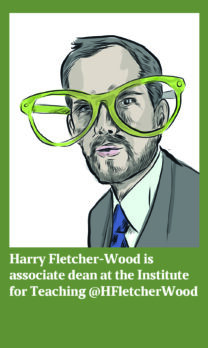Guest reviewer Harry Fletcher-Wood shares his top picks from the edu-blogging world this week
Cognitive Load Theory
By Dan Williams // @FurtherEdagogy
According to Dan Williams, the “one learning theory that I feel all teachers should be made aware of”, is cognitive load theory. He explains how the theory can help explain why some lessons leave us little to remember, and others leave us “more confused than when we entered”. He offers three helpful ways in which he has used the theory in his teaching, including worked examples and dual coding.
Never live like common people; the problems with trying to empathise with those who lived in the past
By Ben Newmark // @bennewmark
Ben Newmark opens this post with a recollection of a walk through an Ethiopian village with a friend, an “Ethiopian from an agricultural background”. “I love this time,” he mused. “It’s when everyone’s at their happiest. Work done for the day, time to eat, talk with friends and then rest.”
His friend said nothing for a long time. Then, “kindly but firmly, in a tone that ended the conversation,” replied: “Ben, you know nothing at all about it.”
Newmark uses this reflection to explore whether or not we can teach empathy in history and some of the troubling implications this has, noting, for example, “the sorts of perspectives children are asked to take when empathising with those in the past. Writing a letter as a Great War soldier, yes. Writing a letter as a general, no.”
Concerning empathy in history teaching
By Anonymous
Ben Newmark’s blog (above) elicited this fascinating response, which examines his ideas and extends them, considering in greater depth what learning a discipline consists of.
The author opens with the words of the French philosopher Simone Weil: while empathy relies on egoism, she says, attention is the “rarest and purest form of generosity”. Attention, that is, to the world.
“Weil describes how the student should become the ‘slave’ of truth… Good historical writing consists in the author submitting herself to the sources, not imposing herself upon them. Good maths is submitting oneself to the numbers; English to grammar, to the writing; science to the experiments; philosophy to the rules of sense and nonsense.”
This is not an argument for authoritarian teaching, it is an argument for students “and the teacher to the search for truth, whether that be careful study of the accounts of the execution of Thomas Beckett or evidence for the manner in which an Ox-bow lake is formed.”
The problem with past exam papers
By Alex Quigley // @HuntingEnglish
In considering how to improve the football skills of his younger son, Alex Quigley notes that while we intuitively feel that “to get better at playing the big games, we need to play more of the big games”, this isn’t actually true.
This example leads him into a discussion of the way Daisy Christodoulou’s Making Good Progress can be applied to the teaching of English. In the past, Quigley would have “drilled [his pupils] lots of times to write usually full exams or essays in timed conditions, tackling lots of full exam questions, giving them a sense of the ‘big game’”. Now, however, he realises that focusing too much on the ‘big game’ too early robs students of the time to “accumulate and remember the knowledge and understanding required to actually play the ‘big game’ with success”.
Kid Logic
By This American Life // @ThisAmerLife
I spend a lot of my time thinking about the pedagogical aspects of misconceptions: what can teachers do to help students better understand a tricky concept? So I enjoyed this podcast, which looked at the same question through a lens of simple enjoyment.
Interviews collected a series of examples like Rebecca, whose friend told her she had discovered her father was the tooth fairy. Rebecca went home and announced that her friend’s father was the tooth fairy – and duly took many years to learn otherwise.
A light-hearted examination brings to life how misconceptions arise among children: listen for business or for pleasure.
A Tour of Stock Photos Academy
By James Theobald // @JamesTheo
James Theobald invites us on a tour of Stock Photos Academy, “a brilliant new free school located in the heart of the country.”
The tour begins “in the sixth form, where we stream the students depending on how photogenic they are. This is the top set in Maths. Here, Maths teacher Mr. Smith is making his pi/pie joke. The sixth formers bloody love that joke.”
I won’t spoil the rest of the tour, just highly recommend it.













Your thoughts